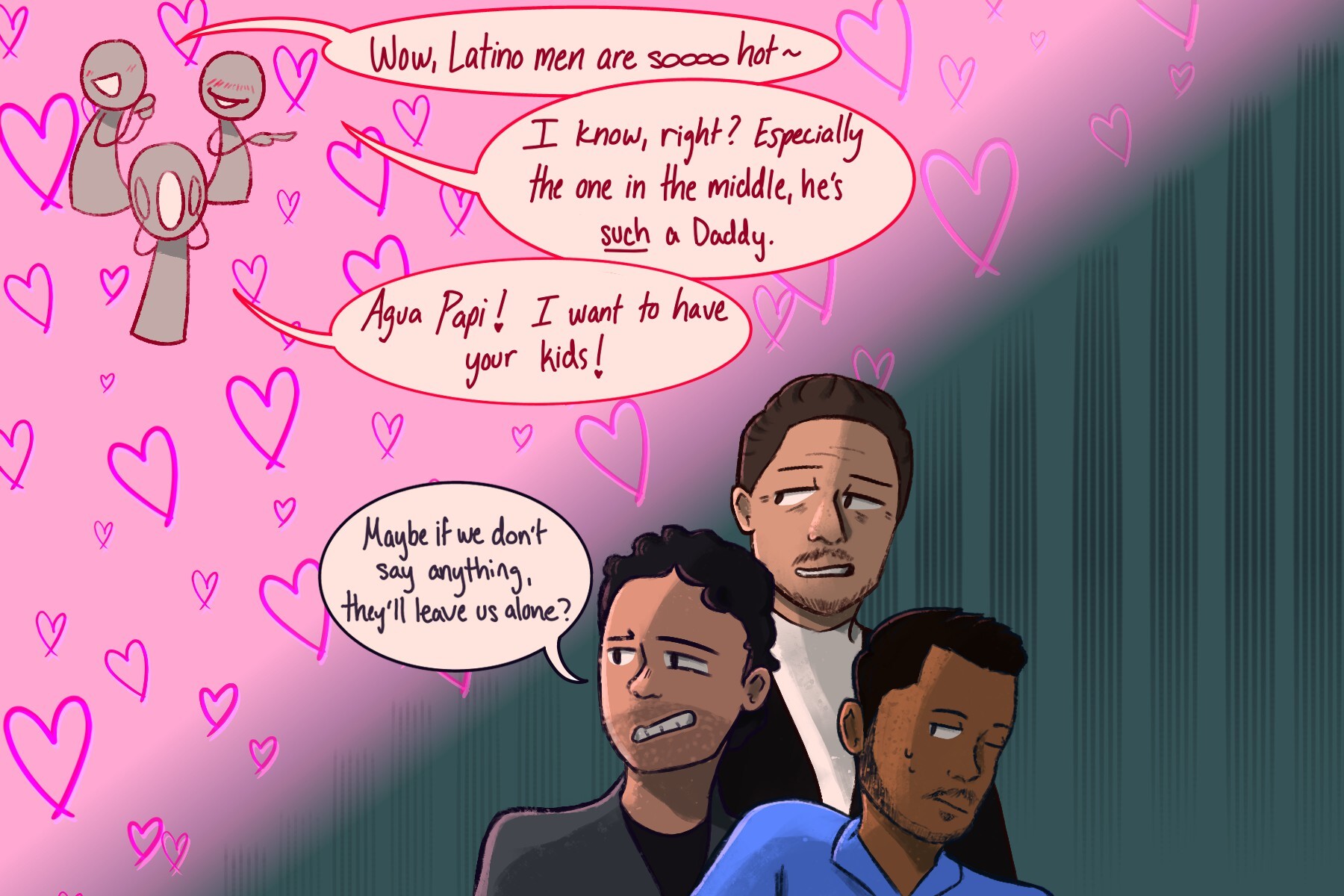The breakout star of “Spider-Man: Across the Spider-Verse” — the highest-grossing film in Sony Pictures Entertainment’s history — is none other than Miguel O’Hara. Upon his introduction as the founder and leader of the Spider-Society, fans immediately took a liking to him — honestly, who wouldn’t? Voiced by Oscar Isaac, O’Hara is a morally complex character whose desire to protect the multiverse at all costs informs the overarching narrative of the “Spider-Verse” trilogy.
But O’Hara’s moral complexity isn’t the first trait audiences noticed. Rather, fans noted that Miguel O’Hara is an incredibly attractive man — and instantly sexualized him. Usually, this behavior only prompts a few raised eyebrows since the sexualization of hot men is characteristic of the fandom experience. However, an alarming number of fans were quick to draw O’Hara bound, gagged and, in most of these illustrations, speaking very awkward Spanish. His dialogue, which consists of rampant grammatical errors and overused phrases like “cariño” and “mi amor,” obviously stems from Google Translate. What makes the dialogue even more jarring is the fact that it isn’t used as an extension of his character in the film, but as a vehicle for objectification.
Many remain unaware of the fetishes hidden within their predilections. As it is currently defined, fetishization describes making someone an object of sexual desire based on some aspect of that person’s identity. The act reinforces harmful stereotypes and, unsurprisingly, perpetuates the racism and discrimination that fetishized groups face. In Miguel O’Hara’s case, the fetishization he experiences originates from the pervasive “Latin Lover” stereotype.
Hollywood constructed the Latin Lover between 1923 and 1929 through characters portrayed by actors such as Rudolf Valentino, Antonio Moreno and Ramón Novarro. The actor who popularized the stereotype was Ricardo Cortez — or Jacob Krantz — who was obviously not Latino. The stereotype characterizes the Latino body as dark, handsome and alluring — a man who conquers women. The Latin Lover’s most prominent mannerism is his surrender to an overwhelming sense of passion. The stereotype is essentially a projection of forbidden desire: a brief passion for white women to pursue before settling for white men. At its core, the stereotype is a form of escapism.
Most fandoms consist of audience members who don’t understand the nuance of living with their identities and bodies at the forefront of their minds. Therefore, when such audience members encounter characters who navigate the world in unfamiliar ways, they reduce the characters to stereotypes in order to fulfill their most basic need: sexual desire. Escapism is essential to fandoms, and sexualizing characters is sometimes the only method by which audiences can attain their fantasies.
Consumerist societal ideals enforce the belief that all things are made for consumption. People must have in order to exist. They must have houses. They must have jobs. They must have identities. However, the belief that consumption is the foundation of human existence begins to blur when people apply it to other people. It becomes a line on glossy paper that easily smudges, for a person can’t “have” another person. Therefore, people who do not belong to underrepresented groups must find other ways to exert power over people who do, namely by sexualizing them. Consequently, many fans drew Miguel O’Hara bound and gagged and stripped to nothing but a basic, entirely stereotypical Latino identity. Although some people cannot specifically relate to O’Hara’s outward Latino-ness, they can render him consumable by stripping him down — literally — in a way that rids him of any and all autonomy and complexity as a character. To put it bluntly, people fetishize Latino men because of their supposedly “inherent” qualities.
Fantasies about “Latin Lovers” who grant people all of their desires become mechanisms of perceived ownership.
Furthermore, the pervasive “Latin Lover” stereotype transcends fiction. During an uncomfortable red carpet interview, an Access Hollywood reporter asked Pedro Pascal, a proud Chilean actor, to read aloud multiple thirst tweets made about him. While thirst tweet interviews are common, all the actors who appear in them agree to participate beforehand; they know what to expect. By contrast, interviewers constantly ask Pascal — without warning — to react to sexual tweets made about him. After fans and interviewers alike dubbed him the “internet daddy,” Pascal could not escape uncomfortable interview situations. At first, Pascal played along with fans’ sexualization of him and his characters — until it became incessant.
Fans and interviewers’ unrelenting sexualization of Pedro Pascal dehumanizes him. It separates him from his personhood and reduces him to an object for consumption. The harmful stereotypes people associate with Pascal’s identity thereby exacerbate his sexualization. For example, some of Pascal’s fans refer to him and Oscar Isaac, an actor of Guatemalan and Cuban descent, as “Space Papis.” These fans are not Latino.
As people become more aware of the “Latin Lover” stereotype’s negative impact on Latinos, a conscious effort can be made to ensure that people don’t perpetuate the fetishization of Latino identity. Ultimately, a more nuanced approach to onscreen representation enables people from a variety of cultures to highlight the complexities of their identities on their own terms. It is therefore imperative that audiences preserve the dignity of the characters they love.















